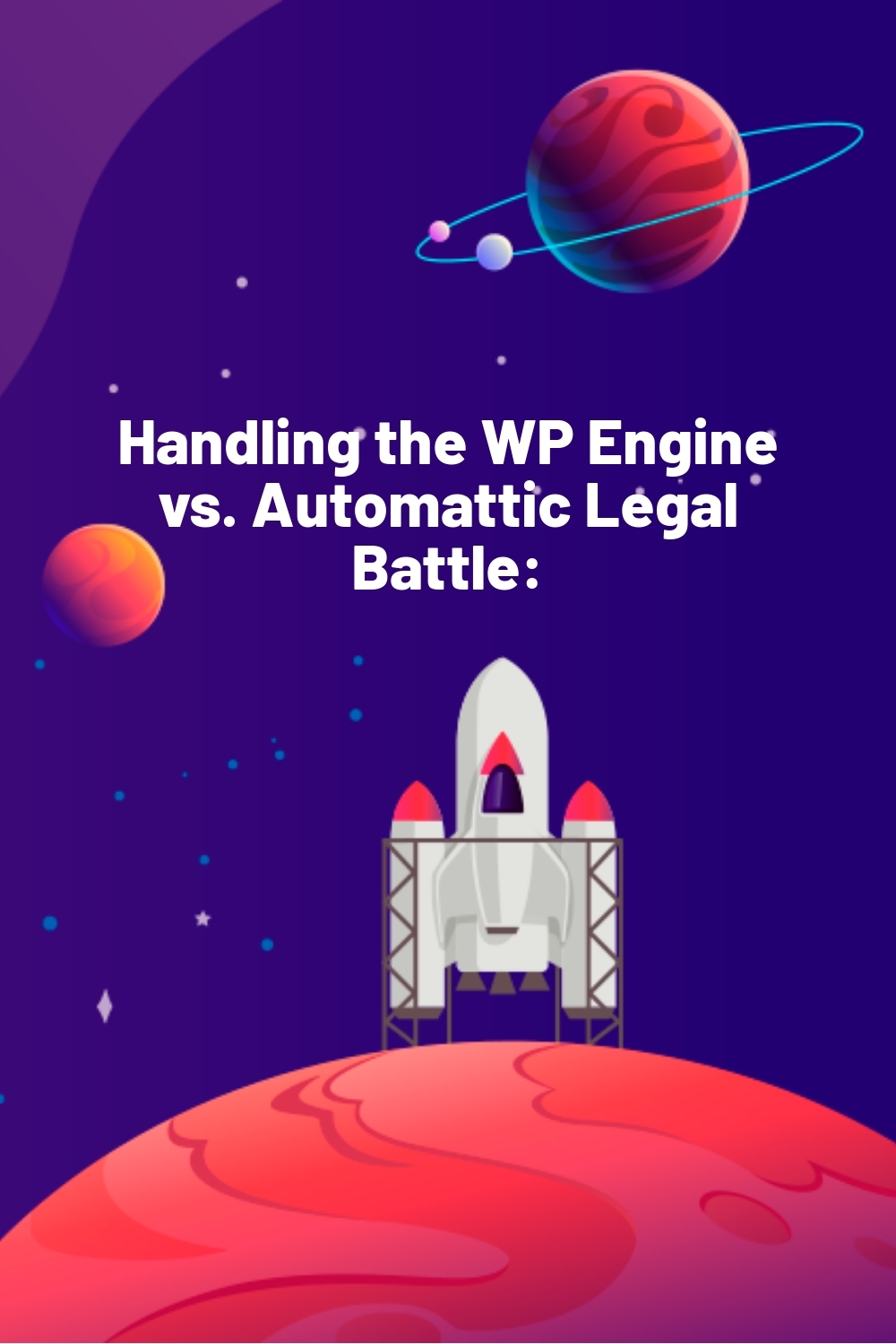WPLift is supported by its audience. When you purchase through links on our site, we may earn an affiliate commission.
Handling the WP Engine vs. Automattic Legal Battle:
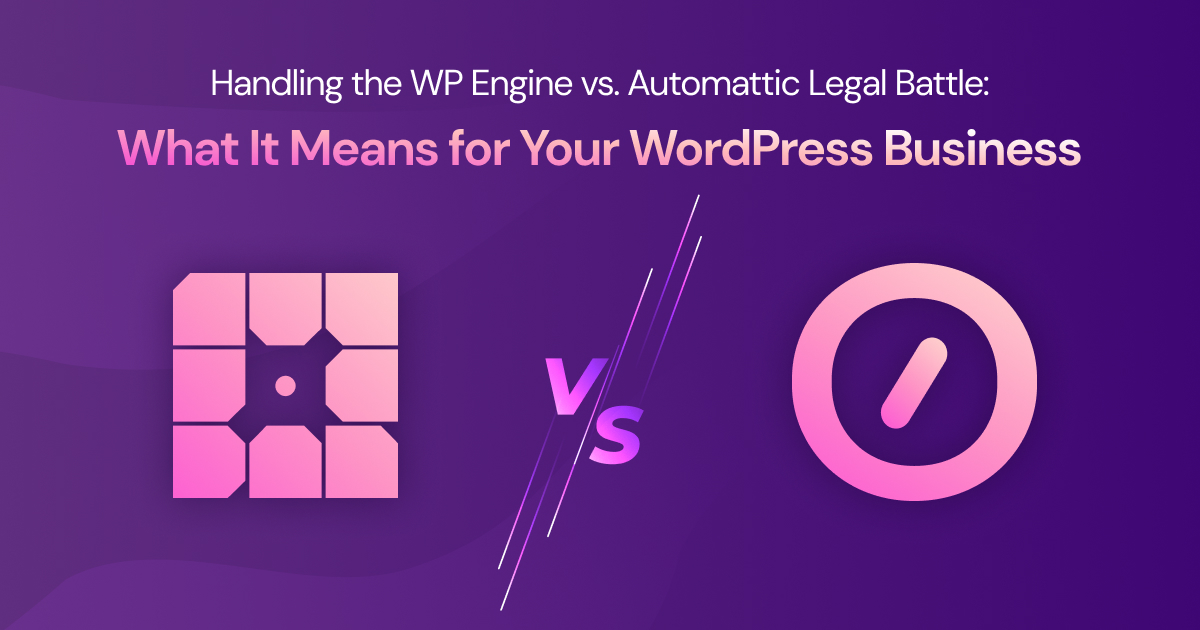
What It Means for Your WordPress Business
It’s rare that the words ‘WordPress’ and ‘Drama’ are ever uttered in the same sentence. Over the last few weeks, however, the ongoing WP Engine vs Automattic legal battles have dominated the conversation within the WordPress community.
The whole unfortunate situation has been covered by countless bloggers, news outlets, and social media posts, yet the team here at WPLift still finds many of our readers coming to us with questions.
- Is WordPress done for?
- Is it time to switch to a new hosting company or perhaps a different website platform altogether?
- What does this mean for the developers, agencies, and business owners who rely on WordPress as part of their core business?
In this guide, we answer all of those questions and more as explain what the WP Engine vs. Automattic lawsuit means for your WordPress business.
What’s All the WordPress Drama About?
We’ve been busy keeping track of all the gory details in our ongoing live blog on the WordPress controversy surrounding Automattic, its CEO, Matt Mullenweg, and their fight against WordPress hosting company, WP Engine.
If you want the full saga, that’s the best place to start. If you simply want the TL;DR; version, here it is:
- Matt Mullenweg is the co-founder of the open-source WordPress.org project. He’s also the CEO of the for-profit company, Automattic, which, among other things, offers a hosted WordPress service at WordPress.com.
- Mullenweg took WP Engine to task in a series of blog posts and a presentation at WordCamp US, accusing the company of trademark violations and failing to contribute to the open-source project.
- Both sides filed lawsuits.
- Mullenweg and Automattic continue to ‘go nuclear’ on WP Engine, such as by banning sites hosted by the company from accessing the WordPress plugin directory.
Should I Stop Using WP Engine to Host Websites
As of right now, there’s no reason to stop using WP Engine as your hosting provider. At least, there’s no reason relating specifically to their lawsuit against Automattic.
Sure, the company has its fair share of critics, but then, what hosting company doesn’t?
The long and short of it is that, if you were happy with your service from WP Engine before all this started, you can confidently stay where you are.
Yes, it’s true that WP Engine was banned from accessing WordPress resources, meaning its customers couldn’t access essential components like the plugin’s directory but, for the time being, that’s been resolved.
The hosting company was given a brief reprieve during which they were able to legally copy the directory over to their own servers for users to access.
In other words, it’s business as usual.
If you decide to switch, we’ve rounded up some of the best WordPress hosting companies to help you choose an alternative to WP Engine.
Should I Stop Using WordPress?
There are even fewer reasons to stop using WordPress.org for your website than there are to stop using WP Engine.
If you’re a self-hosted WordPress user, you’re running free, open-source software that’s available to everyone, and most likely always will be.
Remember, this is software that powers close to half of all websites on the Internet.
We’d argue that WordPress is bigger than any one company or individual. Of course, whether Mr. Mullenweg agrees with that statement or not is another matter, but the fact remains that WordPress isn’t going anywhere and is only getting better.
In fact, by the time you read this, we’ll be getting closer to the official release of WordPress 6.7 which introduces new features and behind-the-scenes upgrades to help the platform meet the needs of businesses, bloggers, and enthusiasts at all levels of technical ability, no matter they’re niche.
Even if WP Engine and Automattic went out of business tomorrow, the WordPress community is still large and diverse enough that there’d still be people contributing to keeping it a stable and suitable platform for years to come.
What Happened to the Advanced Custom Fields Plugin?
If you’re one of the 2-million plus users of the free Advanced Custom Fields plugin, you probably noticed a big change in the last couple of days.
The plugin, which was originally developed by Delicious Brains and later acquired by WP Engine, enables users to easily create custom fields and field groups within WordPress, providing more flexibility in how content is structured and displayed.
https://dev.wplift.com/wp/wp-admin/edit.php?post_type=post
In recent weeks, however, WordPress.org has officially taken control of the plugin, seizing it from the grasp of WP Engine and renaming it ‘Secure Custom Fields’.
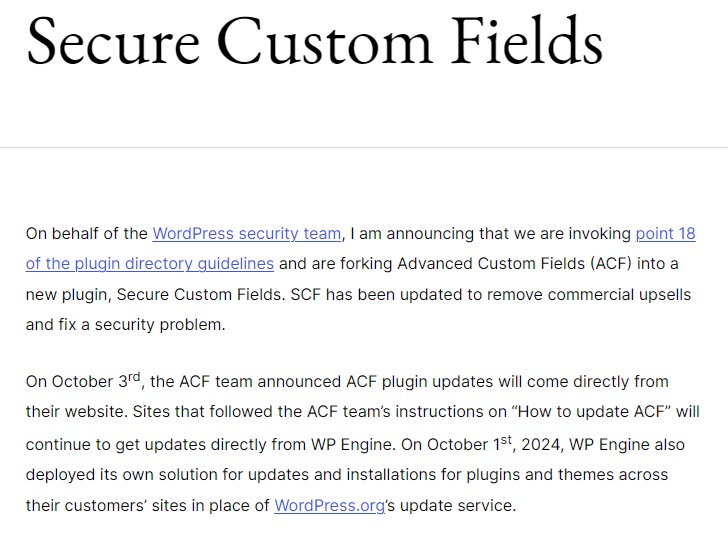
Source: https://wordpress.org/news/2024/10/secure-custom-fields/
Reviews of Secure Custom Fields have been largely negative, some noting issues with the plugin’s technical capabilities, others bemoaning the confusion it caused for their clients and the extra work they had to do as a result of the change.
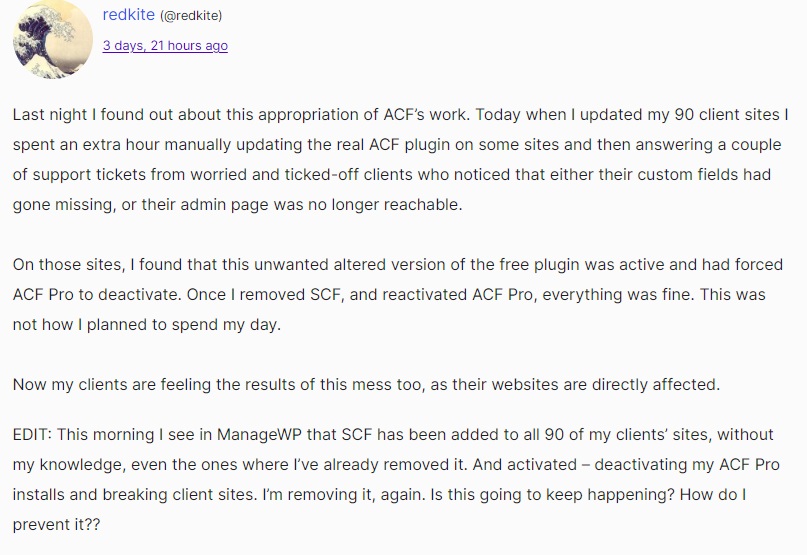
Source: WordPress.org
What does this mean for you?
That depends.
If you’ve found that your Advanced Custom Fields plugin has changed to Secure Custom Fields and it hasn’t affected websites belonging to you and/or your clients, you can keep using it.
If, on the other hand, you’re experiencing problems or simply prefer to use the original Advanced Custom Fields plugin, you can still do so.
WP Engine has issued instructions for installing Advanced Custom Fields from their own servers, without relying on the WordPress plugins directory.

Essentially, this involves downloading the plugin as a zip file and then going to Plugins – Add New Plugin – Upload plugin and installing it on your site that way.
What About Other Plugins?
Advanced Custom Fields may not be the only plugin you have to manually reinstall if you want to keep using it.
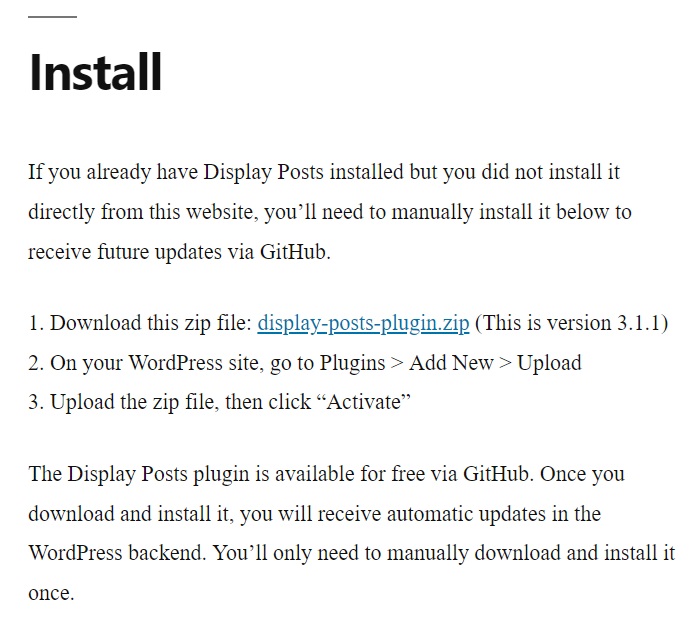
Over the past few days, we’ve noticed more developers moving their tools out of the WP directory and onto their own servers or Git folders.
It should be easy to tell if this affects one of your plugins.

For example, the creator of the popular Display Posts plugin issued a site notice to users about the need to manually update the tool.
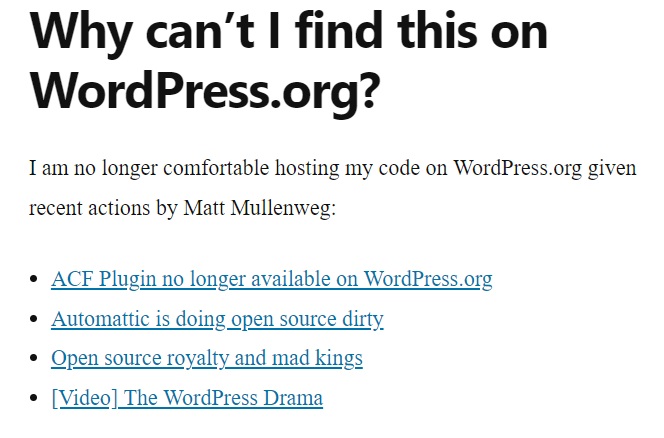
The reason? Mainly to avoid their tools suffering the same fate as Advanced Custom Fields.
If you see a notification like this on your site, it’s worth taking the time to complete these manual updates.
Outdated plugins can cause a myriad of security and performance problems, so we recommend taking a few extra minutes to keep on top of this essential WordPress maintenance task.
What Do The Lawsuits Mean for the Future of WordPress Businesses?
Aside from the technical issues, perhaps the one question we’ve been asked more than any other is what all this means for the future of businesses whose livelihoods depend on WordPress.
At the core of Automattic’s problems with WP Engine is a dispute over WordPress trademark issues, with the use of the ‘WP’ initials in particular gaining much of the attention.
Of course, that raises a lot more questions.
If Mullenweg is successful in suing WP Engine for trademark violation, what does that mean for the countless other WordPress service providers using similar terms to promote their business?
Unfortunately, nobody knows for sure until a court judge makes a ruling, but if there’s one thing we do know, WP Engine is unlikely to be the only company targeted.
A blog published internally for Automattic staff that was leaked to TechCrunch reveals that more trademark disputes are likely to follow.
Writing in the post, the company’s then Chief Legal Officer Paul Sieminski wrote:
“We will be using a multi-pronged strategy that will involve some additional trademark registrations … legal cease-and-desist letters, and a formal paid licensing program for the partners.”
Since then, trademark applications for both “Managed WordPress” and “Hosted WordPress” have been filed and, as of October 2024, are still pending.
Until such matters are solved, WordPress-related brands may be rethinking the way they position themselves in the market, so don’t be too surprised if your favorite companies undergo a rebranding to avoid Automattic’s wrath.
Will I Be ‘Cut Off’ From WordPress if I Continue to Use WP Engine?
As we were working on this piece, a new post on Reddit revealed that WP Engine has filed a legal injunction against Automattic.
The publicly available legal filing notes:
“WPE understands that Defendants will soon demand that agency partners must choose between doing business with WPE, or being similarly cut off from the WordPress community.”
The big question here is, what constitutes an agency partner?
The answer is that this seems to apply to those enrolled in the official Automattic for Agency’s partner program which provides discounts, tools, and resources for WordPress agencies.
If the recent moves are anything to go by, we’re inclined to say that yes, there is a chance that Automattic could expel members from the program if they continue to host with WP Engine.
When Will The WordPress Drama Be Resolved?
The aforementioned injunction notes a court hearing date of March 6, 2025. As we went to press, that’s still 36 days away.
A period of 36 days is a long time, especially when you consider how much has happened between Automattic and WP Engine in the space of just a few weeks.
In other words, this whole ordeal is unlikely to be over any time soon and we have no doubt that the next few days will only raise more questions among the WordPress community.
Here at WPLift, we’ll continue to answer your questions on how the ongoing WordPress legal battles affect you as an end user. For the latest updates, be sure to follow our live Automattic vs. WP Engine blog
